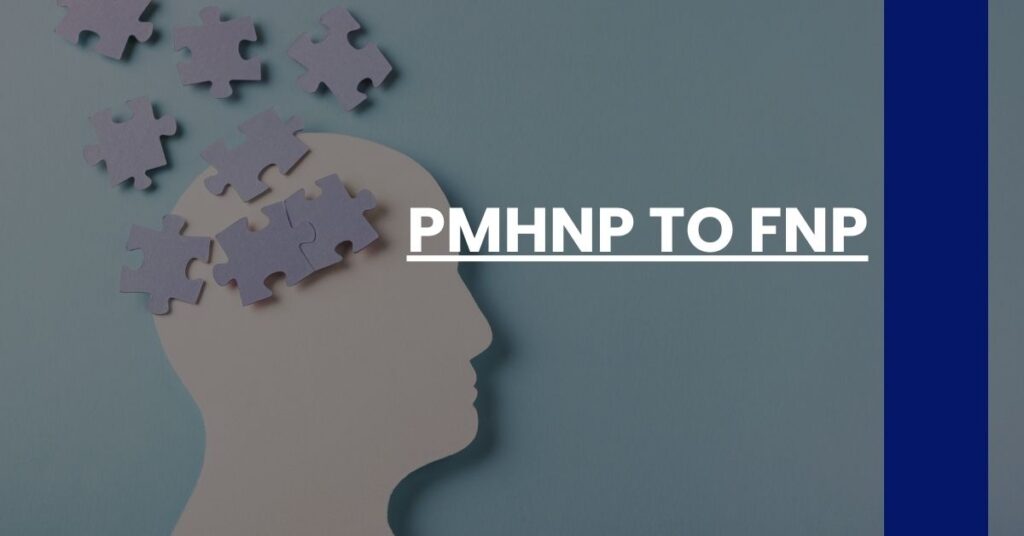Transitioning from a Psychiatric Mental Health Nurse Practitioner (PMHNP) to a Family Nurse Practitioner (FNP) opens up a broader range of opportunities, allowing you to provide care for patients across all age groups and in various healthcare settings. A PMHNP making this shift will need to undertake additional education and training to meet the licensure and certification requirements of an FNP.
In guiding you through this journey, the article ahead will explore:
- Educational Paths: Additional coursework and clinical hours for transition
- Certification: The certification and licensing process for FNPs
- Opportunities and Challenges: Varied job roles and setups for FNPs post-transition
While a detailed read will equip you with in-depth knowledge, this introduction sets the stage for an insightful look into making the seamless transition from PMHNP to FNP.
- Introduction to PMHNP and FNP Roles
- Reasons for Transitioning from PMHNP to FNP
- Educational Paths for PMHNP to FNP Transition
- Certification and Licensing for FNP
- Career Shift: Opportunities and Challenges
- Legal and Regulatory Considerations
- The Importance of Accreditation in FNP Programs
- Conclusion: Is Transitioning from PMHNP to FNP Right for You?
Introduction to PMHNP and FNP Roles
When you embark on a career in nursing, you’re choosing a path of lifelong learning and adaptability. This is particularly true if you’re contemplating the shift from a Psychiatric-Mental Health Nurse Practitioner (PMHNP) to a Family Nurse Practitioner (FNP). To clarify, a PMHNP specializes in mental health, offering therapeutic care and medications to patients with psychiatric disorders, while an FNP provides comprehensive healthcare to individuals and families throughout their lifespan, addressing a variety of acute and chronic health conditions.
PMHNP: A Mental Health Focus
As a PMHNP, you’re well-versed in the complexities of psychiatric care, adept at diagnosing mental health conditions, and equipped to offer tailored interventions. Your expertise is invaluable in a healthcare landscape where mental health is increasingly recognized as critical to overall well-being.
FNP: A Wide-Ranging Role
In contrast, being an FNP means wearing a multitude of hats. You step into exam rooms with families, individuals, and children, addressing everything from preventive health to the management of chronic diseases. For many FNPs, this broad scope is the allure—it means touching more lives in diverse ways every day.
Understanding these roles is the first step in your potential transformation from PMHNP to FNP—a journey that promises expanded horizons and a profound impact across the healthcare continuum.
Reasons for Transitioning from PMHNP to FNP
If you’re a PMHNP aspiring to become an FNP, you may be seeking a more varied practice. Perhaps you wish to interact with a wider population, including all age groups, or maybe there’s a desire to integrate your mental health expertise into primary care to facilitate holistic treatment.
Transitioning from PMHNP to FNP can also open doors to career advancement. While PMHNPs are vitally important in their niche, FNPs often enjoy more diverse job opportunities given their broad qualifications. The ability to smoothly transition patients from pediatric to geriatric care gives FNPs a unique position in primary healthcare settings. By becoming an FNP, you’re not just expanding your opportunities, you’re also aligning with a preventive care model that increasingly defines the future of healthcare.
Educational Paths for PMHNP to FNP Transition
If you’re eyeing the transition from PMHNP to FNP, you’ll need to consider the educational requirements. This typically involves additional coursework and clinical practice to fill in gaps not covered in your initial PMHNP program.
Bridge Programs: A Stepping Stone
Some institutions offer bridge programs specifically designed for nurse practitioners who want to expand their scope of practice. These programs typically recognize your previous experience and education, allowing you to complete the FNP requirements at an accelerated pace.
Additional Coursework: Filling the Gaps
You’ll need to brush up on family-focused care covering pediatric, adult, and geriatric management across a range of health issues. This may encompass pharmacology, assessment, and diagnostic reasoning that spans the full spectrum of family care. Remember, transitioning roles means you’re not just adding knowledge, but also adapting your thinking to embrace a new overarching philosophy of care.
Clinical Hours: Applying Your Knowledge
Your clinical hours are where the rubber meets the road. It’s crucial to acquire hands-on experience in family practice settings. Here, you’ll learn to apply your knowledge in real-world scenarios, dealing with diverse patient groups and learning to manage a multitude of health conditions.
The road from PMHNP to FNP is certainly demanding, but with your deep clinical background, the necessary coursework uniquely complements your existing expertise in mental health.
Certification and Licensing for FNP
As you’re considering this career pivot, getting certified and licensed as an FNP is an indispensable milestone. Every step you take towards adding “FNP” to your credentials ensures that you can confidently provide the best primary care to patients of all ages.
Certification: Your Professional Credibility
Achieving certification as an FNP is more than a formality; it’s validation of your expertise. You’ll need to pass a comprehensive examination, which assesses your mastery over the wider scope of family medicine.
Licensing: State-Specific Imperatives
Furthermore, you must navigate the state-specific regulations governing the practice of nurse practitioners. The licensing process will vary depending on where you plan to practice, but generally, it involves demonstrating your education and certification credentials to a state nursing board.
As daunting as the process can be, remember that each form you fill and every hour you log is bringing you closer to a renewed professional identity that holds the promise to redefine your career and amplify your impact on patient care.
With the certification and licensing milestones ahead of you, the path from PMHNP to FNP marks not just an educational shift, but a web of opportunities to weave your psychiatric expertise into a dynamic family practice tapestry. As you strategize this transition, it’s integral to stay informed about the evolving policies that influence your career’s trajectory.
Career Shift: Opportunities and Challenges
As you navigate the waters from PMHNP to FNP, you’ll find a sea of opportunities awaiting you. Your new role will enable you to serve a broader demographic—from infants to the elderly—across various healthcare landscapes. However, with new opportunities come new challenges.
Opportunities:
- Diverse Work Settings: As an FNP, you could work in private practices, hospitals, clinics, or urgent care centers. Your comprehensive skill set will also be in demand in community centers and schools.
- Holistic Patient Care: You’ll have the chance to provide whole-family care, influencing patient health across multiple generations and impacting public health outcomes on a larger scale.
- Independence: In some states, FNPs operate with full practice authority, meaning you can even open your own practice.
Challenges:
- Adapting to a New Role: Transitioning from PMHNP to FNP involves broadening your medical expertise beyond psychiatry to encompass family medicine. This can be both intellectually demanding and rewarding.
- Updating Clinical Skills: You’ll need to be agile, learning new procedures, and updating your clinical skills to cater to a wider range of health issues.
- Professional Identity: Adapting to a new professional identity takes time and may require you to build a new reputation among peers and patients.
Regardless of the challenges, the journey from PMHNP to FNP opens doors to a career path that’s rich with potential for growth and the satisfaction of providing comprehensive care.
For more insights into the different clinical settings where FNPs can thrive, exploring broader responsibilities, check out this insightful resource.
Legal and Regulatory Considerations
Moving from PMHNP to FNP doesn’t just entail an educational shift; it’s crucial to consider the legal and regulatory landscape. Your excellent track record as a mental health provider sets a foundation, but as an FNP, you’ll face a different set of laws and practice agreements.
Each state’s Board of Nursing governs the scope of practice for nurse practitioners, and these regulations can significantly impact your ability to provide care. Issues such as prescriptive authority, autonomy, and supervisory requirements for FNPs are paramount. Careful navigation through your state’s laws will ensure that the transition is smooth and compliant.
Additionally, it’s important to stay up-to-date with legislation changes that could affect your practice. Ongoing education, professional development, and networking with other healthcare professionals will be crucial in staying informed and proactive in your new role.
For a broader understanding of state regulations and their effect on APRN practice, take a look at this governmental perspective.
The Importance of Accreditation in FNP Programs
Choosing the right FNP program is a pivotal step in your transition. Accreditation is not just a gold star for a program; it ensures that the education you receive meets the rigorous standards necessary for you to provide safe, competent, and ethical care. Accredited programs are recognized by licensing bodies and are often a prerequisite for certification exams.
There are two primary national accrediting bodies for nursing programs: the Commission on Collegiate Nursing Education (CCNE) and the Accreditation Commission for Education in Nursing (ACEN). Their endorsements signify that the curriculum, faculty, and resources meet or exceed the standards for nursing education.
By selecting an accredited program, you’re not only assuring your future employers and patients of your qualifications, but also maintaining eligibility for potential funding opportunities, such as scholarships and grants.
Understanding the importance of accreditation helps secure the integrity of your transition from PMHNP to FNP, forging a path that upholds excellence in patient care.
For a deep dive on accredited FNP programs, certification exams, and state licensure, check out this detailed guide.
Conclusion: Is Transitioning from PMHNP to FNP Right for You?
By this point, you’ve gained a panoramic view of what it takes to make the transition from PMHNP to FNP. It’s a journey that requires grit, commitment, and an unyielding passion for providing patients with the best possible care.
Reflect on your aspirations and contemplate whether this broader scope of practice resonates with your professional calling. Are you ready to embrace the unique benefits and challenges that come with being an FNP? It’s not only a career move; it’s a step towards enriching your practice with a diversity of patient experiences and needs.
If you’re inclined to join a field characterized by versatility and comprehensive patient care, then transitioning from PMHNP to FNP might be the perfect next chapter in your nursing career. Equip yourself with the necessary information, align with the best-accredited programs, and set forth on a path that promises a substantial impact on the lives of countless individuals and families.
Remember, as practitioners dedicated to nurturing the health and well-being of communities, every step you take, from PMHNP to FNP, furthers your journey toward that noble goal.

